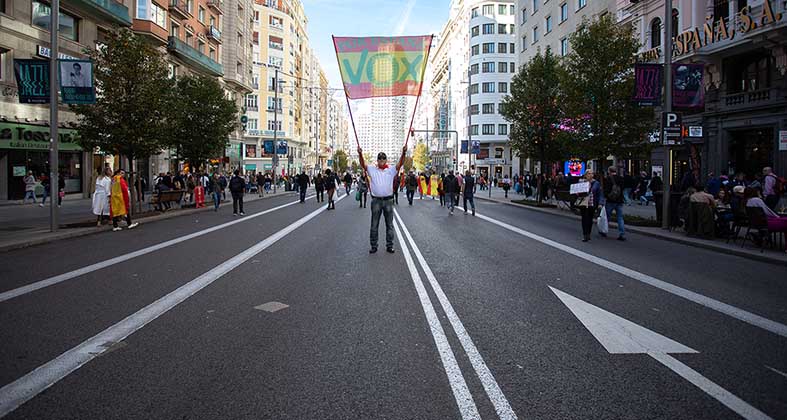
Since the elections, the ultra-right Vox party has been busy mobilising street protests, but has failed to have a great impact. David Karvala warns, however, it is too early to relax
This article originally appeared in Winter 2023/24 issue of Searchlight magazine
In our Autumn issue we carried an analysis of the biggest Spanish far right party, Vox, and the growing influence of its more clearly fascist wing. We warned that their recent electoral setback could further reinforce this section of the party, more oriented on street politics. Events since have confirmed that prediction.
As Pedro Sánchez’s Partido Socialista Obrero Español (PSOE) laboriously put together deals to get a parliamentary majority and form a government, the right and far right became more and more vociferous in their denunciations of “concessions” to nationalist parties, especially the Catalan pro-independence parties. The PSOE’s acceptance of an amnesty for those who have peacefully promoted Catalan independence, especially around the 1 October 2017 referendum, was presented as treason. This led to big street protests involving the conservative Partido Popular (PP), Vox, and open neo-nazis.
In their shared indignation, they forget (or hide) the meetings in 1999 between representatives of the then PP Prime Minister, José María Aznar, and the Basque nationalist armed group ETA. These led to the PP reducing the repression against Basque prisoners in Spanish prisons.
Also forgotten are the PP’s repeated amnesties and pardons for tax dodgers and their own corrupt politicians.
Now they insist on defending the “independence of the judicial system …”, where many judges have Francoite sympathies and the courts habitually interfere in politics, overturning laws approved by democratically elected institutions. Even Prime Minister Pedro Sánchez has denounced this “lawfare”.
A far-right fruit salad
Faced with a probable new centre left government — backed by all parties except the PP and Vox— the right started trying to win on the streets what it had lost in the ballot box.
The protests against a possible amnesty for Catalan activists started in October. In early November, these escalated into demonstrations in front of the PSOE headquarters in Calle Ferraz, Madrid. The largest action, on 6 November, involved thousands of protestors of various persuasions. Other actions were smaller and narrower. There were also some sizeable protests in other cities around the country.
On some nights in Madrid, a clearly fascist contingent tried to break through police lines to reach the PSOE offices, leading to arrests and charges. This police response —in fact much more moderate than their frequent repression against progressive social movements— caused indignation among far-right protestors, normally favourable to police charges.
In theory, the protests were spontaneous or called by new non-party groups. In reality, they were mainly promoted by Vox. They involved a wide range of forces, from the growing Trumpist sector of the PP, through Vox, to neo-nazis and other far-right groups.
The individuals participating were even more varied: conservative families in Lacoste sweaters from the richest parts of Madrid, ultra-traditional Catholic priests, rabid anti-abortionists, swastika-tattooed skinheads doing Nazi salutes … One night, protestors were joined by Tucker Carlson, the sacked former pro-Trump US Fox TV presenter who was visiting Vox.
The protests claimed that Spain would collapse if an amnesty is conceded, and some of the slogans focused on this. But they also included condemnations of Sánchez as a traitor, along with anti-communist, sexist and homophobic chants. Some leading far-right protestors even included in their social media posts denunciations of “globalism”, “woke” and the UN’s 2030 Agenda.
In fact, the newly formed Vox-led youth organisation Revuelta (Revolt), which made itself known with the protests, reproduces in its manifesto many of these standard themes of today’s fascist and neo-nazi groups.
Grave threat
All told, these were large scale right and far-right street protests, sustained over several weeks. They were not, of course, on the same scale as the attacks on the US Capitol on 6 January 2021, or the copycat attack in the Brazilian capital on 8 January 2023, after Jair Bolsonaro’s party was defeated in the presidential elections.
Nonetheless, unchallenged, they represent a grave threat. If the newly formed government fulfils the promises it made to obtain a majority, these forces will find new reasons to protest.
The protestors’ diversity is both a strength and a weakness. It means they can involve people from beyond the neo-Nazi hard-core. But it also means they have profound internal differences. Vox denounces the PP as the “cowardly right”; some neo-nazi groups denounce Vox for being pro-Zionist and neoliberal.
But as the Le Pens (father and daughter) have shown in France, if they seem to be advancing, and if there is no broad and effective opposition, they can grow despite these divisions. The building of united movements against fascism is a more urgent task than ever.
